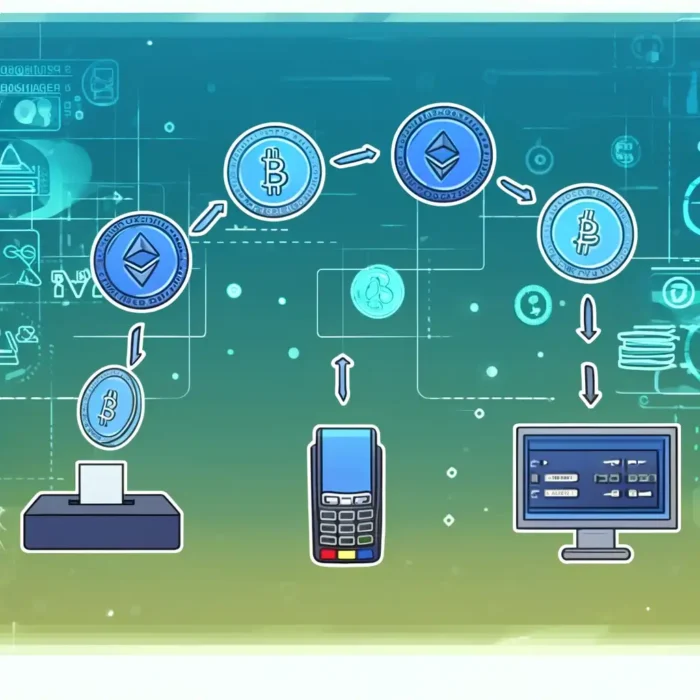Get Scam Alerts & The Latest Crypto News:
In the swirling nebula of our digital age, a new constellation has glittered into prominence – cryptocurrencies. Much like intrepid explorers navigating the mysteries of space, businesses around the globe are cosmic voyagers in the vast digital universe decrypting the cryptic realm of crypto payments. As crypto payment gateways become increasingly instrumental in facilitating transactions, it is crucial to know your supernovas from your asteroids. Sit tight and buckle up, for we are about to embark on a thrilling odyssey. Our mission: evaluating crypto payment gateways. The route map: a detailed guide to due diligence. Warning - side effects might include an enlightened perspective on crypto payments and an empowered business strategy.
Understanding Crypto Payment Gateways: The Basics
The financial landscape of online transactions is rapidly changing with the entry of cryptocurrencies like Bitcoin and Ethereum. Crypto payment gateways have emerged due to the growing popularity of these digital currencies. But what are they exactly and how do they work? Let’s dive into the basics.
A crypto payment gateway is a value exchange system that allows merchants to accept cryptocurrency as payment for goods and services, just like other traditional banking services permit transactions in regular fiat currencies. While traditional bank transactions may involve the customer’s bank and the merchant’s bank, the unique thing about crypto payments is that transactions are done directly with no need for intermediaries such as banks. Instead, they run on a decentralized blockchain network.
When choosing your preferred crypto payment gateway, a number of factors come into play. You need to consider the currencies they support, their fee structure, and how they handle security issues. Here’s a checklist of factors to consider:
- Supported Cryptocurrencies : Check if the gateway supports prominent cryptocurrencies like Bitcoin (BTC), Ethereum (ETH), and Litecoin (LTC).
- Transaction Fees : Although transaction fees are generally lower for crypto payments than traditional payment systems, different gateways might have different fee structures.
- Security : Look for security features like two-factor authentication (2FA) and encryption methods.
- Ease of Integration with website or online platform : The gateway should integrate seamlessly with your existing e-commerce platform.
| Payment Gateway | Supported Cryptocurrencies | Transaction Fees | Security | Integration |
|---|---|---|---|---|
| Gateway A | Bitcoin, Ethereum | 1% | Advanced Encryption | Easy |
| Gateway B | Bitcoin, Litecoin, Dogecoin | 0.5% | 2FA, Encrypted Wallets | Moderate |
| Gateway C | Bitcoin, Ethereum, Ripple | 1.5% | 2FA, Cold Storage | Difficult |
Understanding these aspects of crypto payment gateways can help merchants make an informed decision when integrating cryptocurrency payments into their businesses. After all, crypto payments are becoming an essential part of the future of digital transactions.
Navigating the Landscape: Comparing Different Crypto Payment Gateway Options
With the ever-increasing popularity of cryptocurrency, businesses need to understand the various crypto payment gateway options in order to effectively steer this unique financial landscape. In this article, we delve into some of the top crypto payment gateway providers and evaluate them for trust, product offerings, fees, and market reputation.
CoinGate, Coinify, and BitPay are among the top players in the crypto gateway space. Let’s start with a comparison of these major providers:
| Provider | Trust level | Product offerings | Fees | Reputation |
| CoinGate | High | Extensive tools | 1% | Good |
| Coinify | High | Flexible | 0.5% | Excellent |
| BitPay | High | Streamlined | 1% | Great |
CoinGate is well-known for its easy integration and extensive set of tools. However, its 1% fee raises eyebrows. On the other hand, Coinify provides a robust, flexible, and user-friendly service which, combined with a smaller fee, solidifies its standing in the market. BitPay, despite sharing a similar fee structure to CoinGate, stands out with its streamlined service which simplifies transactions for users.
When picking out a provider, you’ll want to assess more than just fees. It’s important to consider the ease of integration, the types of digital currencies supported, and the payment processing speeds. Most importantly, ensure that your chosen provider has rock-solid security measures in place, as this is a primary concern in the realm of digital currencies.
Security is Key: Evaluating the Safety of Crypto Payment Gateways
In the ever-evolving digital age, payment methods have equally suffered substantial transformations, with the advent of cryptocurrencies being the most significant. As digital currencies gain traction in global commerce, more businesses are turning to crypto payment gateways for its numerous perks including minimized transaction fees, ensured privacy and streamlined processes. However, not all gateways guarantee the same level of security. Hence, a diligent evaluation is key to ascertain the safety and reliability of these platforms.
Security is the bedrock of any financial transaction, more so with crypto payment gateways. Evaluating the safety measures put in place by these gateways often requires a focused look into aspects such as security protocols, the reputation of the gateway, compliance with regulations, and the technology used in securing transactions.
- Security protocols: These encompass both the procedural and technical measures that the gateway employs to secure transactions. They may include encryption methods, two-factor authentication, and security keys.
- Reputation: A gateway with a track record of safe, reliable transactions is a strong indicator of good security. The surefire way to evaluate this is through customer reviews and business ratings.
- Regulatory compliance: This ensures that the gateway meets industry standards and legal requirements related to monetary transactions. Particularly, it highlights the gateway’s commitment to user security and privacy.
- Technology: From blockchain technology to secure socket layer (SSL) encryption, the technology deployed by the gateway plays a critical role in securing transactions - data and funds alike. Thus, assessing the technology’s robustness is imperative.
Consider the table below to understand some of the popularly trusted crypto gateways against these evaluation markers.
| Gateway | Security Protocol | Reputation | Regulatory Compliance | Technology |
|---|---|---|---|---|
| BitPay | 2FA, Secure keys | Highly-rated | Fully compliant | Blockchain with military-grade encryption |
| CoinGate | SSL encryption, 2FA | Trusted by many | Regulation compliant | Blockchain with advanced security technology |
| GoCoin | IP whitelist, 2FA | Positive reviews | Comprehensive regulatory compliance | Hierarchical Deterministic Wallets |
Conclusively, ensuring the safety of your funds and data when utilizing crypto payment gateways requires a meticulous vetting process. The perceived benefits of these gateways can be fully harnessed only when the proper due diligence is done.
Decoding Transaction Fees: Costs Associated with Crypto Payment Gateways
In the world of cryptocurrencies, transaction fees are an inevitable element to consider when contemplating the use of crypto payment gateways. Transferring digital assets from one wallet to another or purchasing items or services using cryptocurrencies often include some fees, which vary based on the gateway used. In this guide, we dig deep into the matter, offering insights to help you decipher these often-misunderstood charges.
Cryptocurrencies operate in a decentralized environment and most transactions are processed by a network of computers in a process known as mining. With each transaction, there are costs involved in the form of computational power and electricity, which translate to transaction fees. These fees act as an incentive for miners who validate and add your transactions to the blockchain.
| Crypto Payment Gateway | Average Transaction Fee |
|---|---|
| BitPay | 1% |
| CoinGate | 0.5% |
| GoCoin | 1% |
It’s important to note that, besides these fees, some crypto payment gateways include additional charges. These extra costs could be for setup, monthly service, or even chargebacks. For instance, Merchant Gateway Solutions can charge a setup fee while some like CoinGate have a ’chargeback’ fee in case a customer disputes a transaction.
Not all transaction fees are fixed. For example, Bitcoin and Ethereum, which are some of the most prominent cryptocurrencies, have fluctuating transaction fees. These fees can go high when the network is busy.
Lastly, it’s essential to be mindful of the withdrawal fees. Some crypto payment gateways charge you for extracting your funds from their platform. Knowing these facts can help you plan accordingly and choose the best crypto payment gateway for your needs.
Crafting a Decision: Making the Best Choice for Your Business
Deciphering Blockchain Technology
Blockchain technology and cryptocurrencies are gradually proving to be valid alternatives to traditional banking. Integrating crypto payment gateways can put your business on the fast track to the future. But how do you discern which one is the right choice for your entity? It begins by understanding the nuances of blockchain technology.
The technology underpins cryptocurrencies. You might compare it to the ledger that banks use, but decentralized and publicly accessible. On the blockchain, every transaction can be traced back to its source, which fundamentally offers a transparency that current banking systems lack.
The Ethos of Crypto Payment Gateways
- Secure Transactions: Crypto payments are encrypted, making them hard to hack, ensuring your customer’s data is secure.
- Cost-Effective: Crypto transactions eliminate the need for banks, and thus bank fees. This can be a significant saving for your business.
- Fast Processing: Without banks slowing down the process, transactions and transfers are almost immediate.
- Global Reach: Cryptocurrencies are not bound by country borders, so you can reach a global market with ease.
Evaluating Your Options
When considering various crypto payment gateways, key parameters you might need to examine include transaction fees, currencies supported, payment processing time, security features, and client support.
| Gateway | Transaction Fee | Currencies Supported | Processing Time | Security Feature | Client Support |
|---|---|---|---|---|---|
| Gateway 1 | 0.5% | Bitcoin, Ethereum | 10 min | 2FA | 24/7 |
| Gateway 2 | 1% | Bitcoin, Ethereum, Litecoin | 5 min | SSL Encryption | Business hours |
Remember that ultimately, the choice should align with your business model and goals. In the world of cryptocurrencies and blockchain, it all boils down to your appetite for progressive technology, openness to emerging markets and the desired level of financial autonomy.
The Conclusion
In the digital kaleidoscope of cryptocurrency, choosing the most fitting crypto payment gateway may seem more like navigating a labyrinth than a simple task for business owners. However, with the right map in hand—the one woven through the paragraphs of this guide—decoding the enigmatic cryptoland becomes less insurmountable.
Remember, as the cryptography of today translates into the commerce of tomorrow, pitfalls aren’t erased—they just wear different faces. But equipped with the right knowledge, a discerning eye and diligent practice, you can unveil the hidden potential of crypto payment gateways, pioneering your business into uncharted economic terrains. So here’s to a future where trust is digitized, transactions are democratized and your enterprise, forever revolutionized. Welcome to the future of money.

